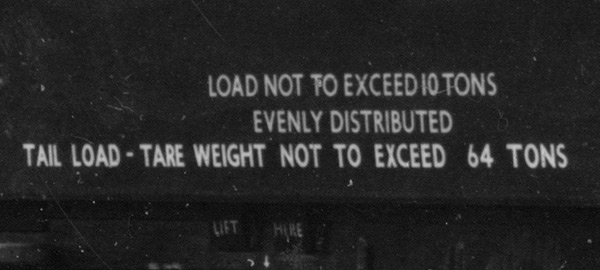Class 128 Gloucester RC&W Parcel DMU Cars
Liveries
Green with whiskers
Delivered in lined green, "Parcels Service" lettering was displayed on both sides on the lower bodyside. Despite only ten vehicles, there were three variations of whiskers.

Split whiskers
The four non-gangwayed London Midland Region vehicles (55987-90) had the four-character headcode box under the centre cab window, and the whiskers were on either side, not meeting at the bottom like most classes. One of the LMR Class 128 vehicles with two vehicles in tow at Cricklewood on 20/12/60. David Lamb.
Gangway cover whiskers
The six Western Region vehicles (55991-6) had the four-character headcode split in two on either side of the gangway. W55992 seen at the west end of Southall Shed. Date unknown. Stuart Mackay Collection.
Double whiskers
When whiskers were applied, some had a double set on the gangway covers. W55992 passes Spring Road with a down parcels working on the North Warwickshire line at 4.13pm on 29 September 1960. Michael Mensing.

Above: text carried above the right-hand bogie, the left side had just the bottom line about the tail load.
Green with yellow panel

In about 1963 the whiskers were replaced by yellow panels. On the ungangwayed sets these were applied to the lower cab front, the gangwayed ones had the gangway cover painted yellow. M55989 is seen at 14A Cricklewood, 18/10/64. Keith Gunner.
Rail Blue with yellow panel

It is thought that just two WR vehicles receive the early blue livery with yellow panel (the gangway cover). IN the image is thought to be W55991 (the other would be 55992). It is working with a Derby suburban DMBS, the pair pulling a BR(SR) green liveried CCT at Twyford c.1968. Note that the 'Parcels Service' lettering is now together rather than either side of doors. 53A Models of Hull Collection.
At least one LMR vehicle was also treated in this manner, but without the white cab roof domes. At this time BR was experimenting with an airless spray painting method, and this livery style always seemed to have a matt finish.
Rail blue with full yellow end

Full yellow ends were soon the standard in the rail blue era. Here M55994 and M55995 sit on the bridge over the River Severn at Shrewsbury station, 25th August 1974. Paul James.
At least one vehicle - 55989 - had for a period a yellow end that did not wrap around the corner to the edge of the door. This was probably a vehicle that originally had just a small yellow panel on the end, and in the image the bottom of the cab doors appear to have been repainted, this would have been the original location of the BR logos.
By October 1987 the two London vehicles 55991/2 would have the vehicle numbers applied to the cab front in grey numerals on the non-driving side.
Two-tone Blue with red stripe

In September 1985 Tyseley's 55994, set number T004, appeared in 'Express Parcels' livery. It is seen stabled at Tyseley on 07.12.1985. Andy Cole.
Soon after 55993 was treated the same. Both would have black around the cab windows, 55993 would have its number above the cab windows in white (55994 didn't).
There were many differences between the two vehicles. Number 3 had the 'Express Parcels' all in capitals, 4 didn't. AT the opposite end of the body 3 had a rectangular red star yellow / red coloured vinyl, 4 had white and red stars. Number 3 had larger than normal vehicle numbers on the lower bodyside at the exhaust end on both sides, 4 had its numbers on the red stripe on the left hand side of each side. Both vehicles had had their gangways removed, 4 still had headcode boxes, 3 didn't. Buffers - 4 had the cut style, 3 had oval.
Royal Mail Red

In February 1988 Royal Mail Red livery appeared with twin lower bodyside stripes and Royal Mail lettering. Sliding doors were thick red / yellow stripes at 45 degrees. Freshly painted is the first to appear in these colours, 55992 at Reading MPD in Saturday 20 February, 1988. Mel Holley.
Five vehicles were to receive these colours: 55991 / 55992 / 55993 / 55994 / 55995.
Identification aid: 1 and 2 still had gangways (1 had 'C1' on the corners, 2 did not). 3/4/5 had had the gengways removed, 3/5 had the headcode boxes removed, 3 had oval buffers, 5 cut, 4 still had the headcode boxes (painted yellow).
Summary
Description
Diagrams & Works Pics
Numbering & Driving Inst.
Liveries
Operations
Images
No Class 128 vehicles were preserved.




